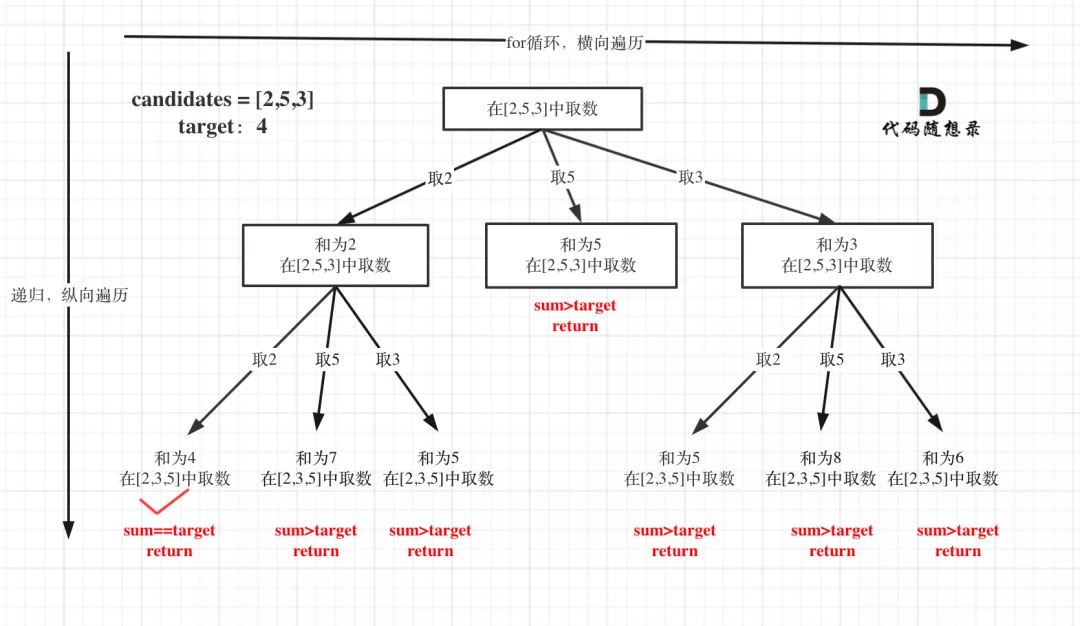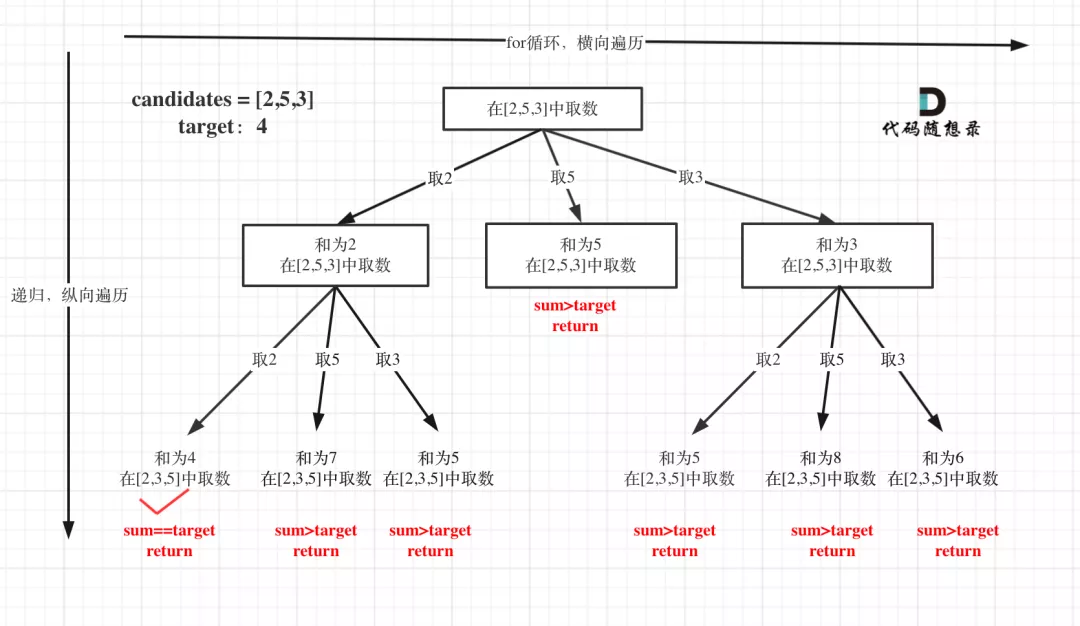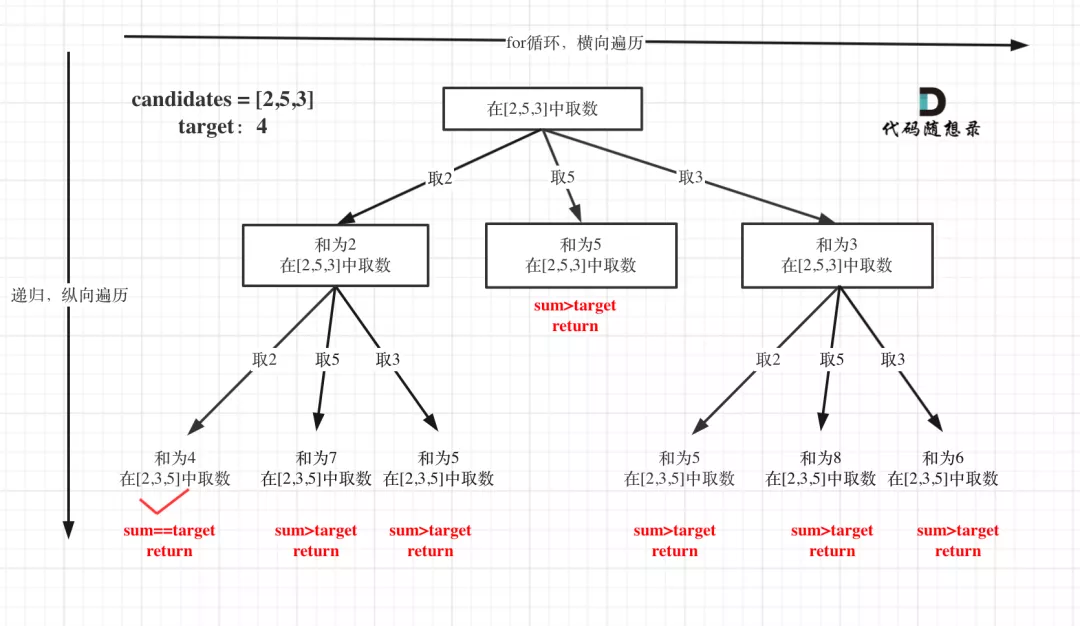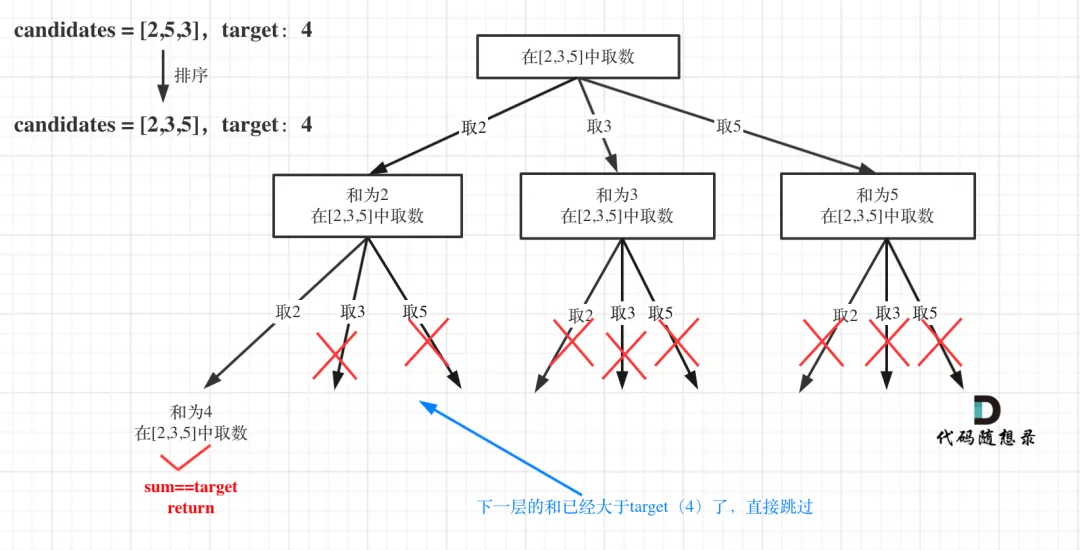问题
给定一个无重复元素的数组 candidates 和一个目标数 target ,找出 candidates 中所有可以使数字和为 target 的组合candidates 中的数字可以无限制重复被选取
说明:
所有数字(包括 target)都是正整数
解集不能包含重复的组合
示例 1:
输入:candidates = [2,3,6,7], target = 7
所求解集为:
[
[7],
[2,2,3]
]
示例 2:
输入:candidates = [2,3,5], target = 8
所求解集为:
[
[2,2,2,2],
[2,3,3],
[3,5]
]
思路

因为本题没有组合数量要求,仅仅是总和的限制,所以递归没有层数的限制,只要选取的元素总和超过target,就返回
回溯三部曲
- 递归函数参数
- 这里依然是定义两个全局变量,二维数组
result存放结果集,数组path存放符合条件的结果。(这两个变量可以作为函数参数传入) - 首先是题目中给出的参数,集合
candidates,和目标值target - 此外我还定义了
int型的sum变量来统计单一结果path里的总和,其实这个sum也可以不用,用target做相应的减法就可以了,最后如果target==0就说明找到符合的结果了,但为了代码逻辑清晰,依然用了sum
- 这里依然是定义两个全局变量,二维数组
本题还需要**startIndex**来控制**for**循环的起始位置,对于组合问题,什么时候需要**startIndex**呢?
- 如果是一个集合来求组合的话,就需要startIndex,例如:leetcode-77:组合
- 如果是多个集合取组合,各个集合之间相互不影响,那么就不用
startIndex,例如:leetcode-17:电话号码的字母组合注意以上只是说求组合的情况,如果是排列问题,又是另一套分析的套路
List<List<Integer>> result = new ArrayList<List<Integer>>();List<Integer> path = new ArrayList<Integer>();public void backtracking(int[] candidates, int target, int sum, int startIndex)
- 递归终止条件
在如下树形结构中:
从叶子节点可以清晰看到,终止只有两种情况
sum大于targetsum等于targetif (sum > target) {return;}if (sum == target) {result.add(new ArrayList<Integer>(path));return;}
单层搜索的逻辑
单层
for循环依然是从startIndex开始,搜索candidates集合for (int i = startIndex; i < candidates.length; i++) {sum += candidates[i];path.add(candidates[i]);backtracking(candidates, target, sum, i); // 关键点:不用i+1了,表示可以重复读取当前的数sum -= candidates[i]; // 回溯path.remove(path.size() - 1); // 回溯}
class Solution {List<List<Integer>> result = new ArrayList<List<Integer>>();List<Integer> path = new ArrayList<Integer>();public void backtracking(int[] candidates, int target, int sum, int startIndex) {if (sum > target) {return;}if (sum == target) {result.add(new ArrayList<Integer>(path));return;}for (int i = startIndex; i < candidates.length; i++) {sum += candidates[i];path.add(candidates[i]);backtracking(candidates, target, sum, i);sum -= candidates[i];path.remove(path.size() - 1);}}public List<List<Integer>> combinationSum(int[] candidates, int target) {backtracking(candidates, target, 0, 0);return result;}}
剪枝优化在这个树形结构中:

以及上面的版本一的代码大家可以看到,对于sum已经大于target的情况,其实是依然进入了下一层递归,只是下一层递归结束判断的时候,会判断sum > target的话就返回
其实如果已经知道下一层的sum会大于target,就没有必要进入下一层递归了
那么可以在for循环的搜索范围上做做文章了
对总集合排序之后,如果下一层的sum(就是本层的 sum + candidates[i])已经大于target,就可以结束本轮for循环的遍历
如图:
for循环剪枝代码如下:
for (int i = startIndex; i < candidates.length && sum + candidates[i] <= target; i++)

